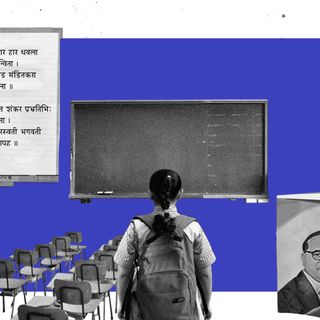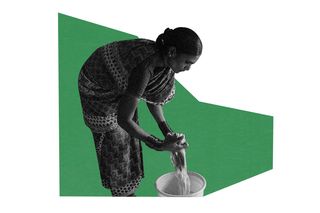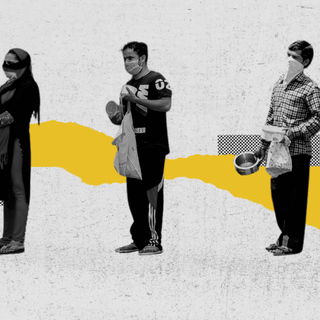
Indian Domestic Workers Need Better Labor Laws as Discrimination Worsens During Covid19: ILO Report
Pre-existing bias combined with the Covid19 pandemic has resulted in loss of jobs and income for many workers in India.

Domestic workers in India were left out of the economic and health safety nets during the pandemic, a new report notes, suggesting ways to frame robust health and social security rights for a “better world of work.”
The report was published by the International Labor Organization on Tuesday and focused on the occupational safety and health (OSH) paradigm — one that centers around wage, inequality, structural loss, and income regulations — to undergird the importance of looking after domestic workers’ rights.
“Covid19 creates a very particular kind of OSH implication, thinking about the novelty of a private employer as a workspace,” Gautam Bhan, one of the authors of the report and a researcher at the Indian Institute for Human Settlements, noted at the press launch.
While the pandemic has shifted the reality of several workforces, for domestic workers who work closely in people’s homes, the risk of infection and compromised safety is heightened. Moreover, domestic workers are among the worst affected, economically and socially, as several reports have shown in the past.
The impact of the pandemic on domestic workers was more layered in India, where they have always faced inequality on the basis of gender, class, and caste. Thus, newer challenges that emerged during the pandemic left them worse off.
“Domestic workers are doubly disenfranchised due to their caste, class, and migrant identities. Also, the report is socio-geographically based on the unique social rubric of urban India and other South Asian nations where caste, class, and gender come together to form unique identities and struggles for domestic workers,” the report noted.
“They don’t give us water. They don’t let us use the bathroom. They don’t let us in the house, and they refuse to touch us. It feels as if all our progress to overcome untouchability has been undone. We feel a similar disregard today, as we felt under those practices,” two community leaders interviewed by the researchers said.
Pre-existing vulnerabilities combined with the Covid19 pandemic have resulted in the loss of jobs and income — but also the re-negotiation of wages and working conditions has left them worse off. Domestic work remains the largest field of informal unemploymentfor women; 83% of women reported severe to moderate economic crises for their families causing further anxiety over the security of jobs, according to a report by the Institute of Social Studies Trust. The lockdown last year affected 91.3% of domestic workers.
“If we work, we die because of Covid19. If we don’t, we die anyway… during the lockdown, we didn’t even earn anything,” Vishakha of SEWA Union, an NGO dealing with domestic workers’ rights, said.
Related on The Swaddle:
Elite Housing Complexes Are Increasingly Policing, Segregating Domestic Workers Amid the Pandemic
The discrimination and challenges faced by domestic workers during the pandemic led to two main things: financial loss and health risk. Women lost jobs, their wages were cut, some were asked to limit their work to one household only to avoid the risk of infection. While the government provided welfare schemes to other labor sections, domestic workers went unnoticed despite the Disaster Management Act mandating compensation to affected workers.
“There is no security for it. Everyone gets a minimum Rs. 5,000-10,000, we don’t even get that,” Vishakha notes. As of now, 13 states have minimum wage welfare schemes, but activists note there is no mechanism to implement it. “We faced restrictions on working elsewhere. Do we pay rent, pay for our kid’s schools, or feed ourselves?”
A recent paper that surveyed domestic workers in Kochi, Delhi, and Mumbai between August and November last year noted: “Debts increased for 10% of the families and more than 11% families were forced to sell their personal assets for survival. About 57% of domestic workers reported stigma and discrimination at workplace, and 40% worked without any safety measures,” the paper said.
The health aspect of Covid19 made things doubly difficult. Several rules such as wearing a mask at all times, sanitization/washing of hands-on entering work-home, and screening at apartment gates – are in line with universal Covid19 safety guidelines and accepted by all stakeholders as necessary and reasonable, the report notes. “Yet these are often accompanied with other personalized rules for which there are no accepted universal guidelines: requirement to bathe or change clothes before starting work, agreeing to work only at one home (without compensation for losing other jobs), or redesigning work and work schedules to reduce certain work identified as high risk and adjust payment accordingly.” Several reports have pointed out how the employers hid their Covid19 results or lied about it — a vile decision that impacted the health of domestic workers.
The ILO report recommends the following ways to achieve parity in a pandemic world: both workers and employers must wear masks at the workplace; if the size of the workplace (house) does not allow social distancing, an employer must still try to distance as much as possible; employers should mandatorily disclose health status, particularly Covid19 positive cases, within the household; offer paid leave if workers have Covid19 like symptoms.
The key — the researchers note — is a collaboration between the employer and worker to establish the risk. Because beyond the economic loss and health risk, it is also a matter of basic human rights and dignity. While the goal may be hard to translate in an Indian setup where domestic workers are often at a disadvantage due to social stratification, fair and robust labor laws will aid workers’ struggle.
“For those who haven’t lost jobs — with increased work hours, and increased risk of infection of Covid19, and other risks due to violence and harassment. It is clear we need to work towards legal and policy framework… to realize a sustainable and equitable recovery from the crisis,” Aya Matsuura, a gender specialist at ILO, said.
Saumya Kalia is an Associate Editor at The Swaddle. Her journalism and writing explore issues of social justice, digital sub-cultures, media ecosystem, literature, and memory as they cut across socio-cultural periods. You can reach her at @Saumya_Kalia.
Related


More People Are Dying Globally of Hunger Than of Covid19: Oxfam Report
